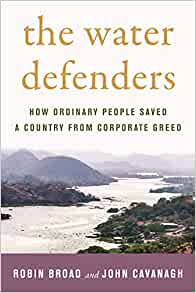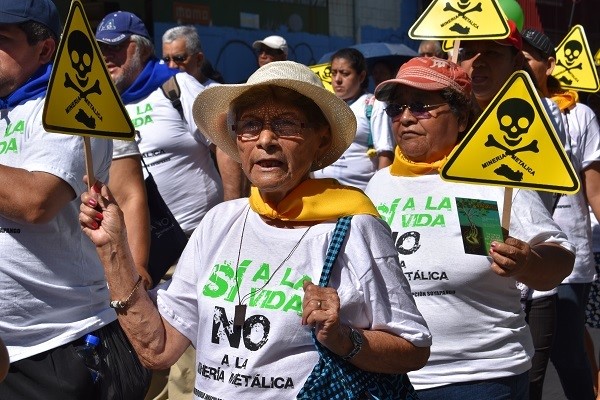The Water Defenders: How Ordinary People Saved a Country from Corporate Greed
By Robin Broad and John Cavanagh, Beacon Press, March 2022
Reviewed for LAB by Malcolm Boorer
In March 2009 while I was in El Salvador as part of an election observer team, I had the chance to visit Cabañas and learn about how gold mining was being opposed by ADES (the Association of Economic and Social Development). With the historic Presidential election coming just after, my memory of this visit soon faded, but thanks to this valuable account I can see how it fitted into a much wider, unfolding story.

The authors entered the story a few months later, after the murder of an anti-mining campaigner, when local Salvadoran activists came to accept an award in Washington, allowing them to link up with international partners. It turned out to be a much longer partnership than they expected, and this book tells the detailed and compelling story of this struggle against mining. It is a Salvadorean story, but there are many lessons that go well beyond the frontiers of this tiny country.
The authors chart the history of gold mining in Salvador, including the work of local activists. They find that these campesinos, the ordinary people of the sub-title, can be just as concerned about the environment as better off liberal westerners, and local campaigns by groups such as ADES and La Mesa (the Round Table bringing together Salvadoran water defenders) were having some effect, as I found in March 2009.
In this book we learn that these local people were well informed, managing to find a way to produce an independent report, and used imaginative methods, like putting together a soap opera about water scarcity for the local community radio. We also learn that they face real dangers, as is clear from the murder of the local leader, described at the very start of the book, and which remains unsolved at the end.
A chapter called ‘A New Pact with the Devil’ explains the fears expressed by these campesinos. Often when gold is extracted other lethal products are released, lingering for years, if not centuries. It is called acid mine drainage, but you only find out what’s released after mining starts. Then more gets released every time it rains.
As mining is carried out, directly or indirectly, by multi-national corporations, local campaigns like this need the right kind of international alliances. The authors describe the organisation of North American support groups. While some demonstrated outside World Bank headquarters others were inside attending meetings, with the authors even taking up invites for a reception for the 50th anniversary of ICSID.
ICSID (the International Centre for the Settlement of Disputes) is the World Bank’s part of the ISDS system, an important part of this story. As well as all the other problems of the ‘Corporate Courts’, described in my earlier LAB article, in this story too they effectively gagged an elected government preventing it from doing or saying anything for years while the claim proceeded. One mining executive calls ISDS as ‘high stakes poker’, though in this case the investors did not hit the jackpot. A long and determined campaign eventually saw El Salvador became the first nation to ban all metallic mining in 2017.
The authors chart the many unexpected twists and turns of this campaign, and one of the authors’ key lessons is the importance of the unlikely allies pursued by the water defenders. In El Salvador reaching out to former enemies in a brutal and recent civil war was never likely to be easy. But while the pre-2009 right wing and pro-business government halted mining, its successor from the left included some who saw mining as good way to generate income for a virtually bankrupt nation.
Gaining support was a tricky, at times unpredictable, business, A good example here was the Catholic Church, a crucial actor in El Salvador. The first Archbishop they approached, known to be pro-business, seemed unresponsive until he heard the word cyanide. It turned out that he had a chemistry degree, while for his cautious successor, a key factor was an encyclical from Pope Francis urging action to defend the environment. The Archbishop later suggests that the victory against mining involved a miracle from on high, though the authors quickly add that without the blood, sweat, tears and doggedness of many there may not have been such a miracle.
This a well told story, though it would have benefited from some photos, and a map. It is also a story that may not be over. The epilogue includes the election of the new president, Nayib Bukele, and notes that up until mid-2020 he had taken no action to change laws, nor indicated any views concerning mining. However, the book was published before this year’s parliamentary changes which have increased the potential for reversing previous decisions about mining or anything else. The inspiration of these water defenders whom the authors and I met back in 2009, and the lessons so well told in this book, may still be needed.


